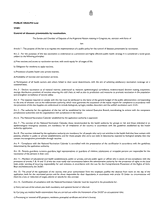Public Health Law 27491 - Control of diseases preventable by vaccination

This law establishes the legal basis for mandatory vaccination in Argentina. Articles 6 and 7 state that an application authority has the right to set the National Vaccine Calendar and that all included vaccines are mandatory for anyone residing in the country. Article 7 further states that, in an epidemiological emergency situation, all vaccines deemed by the application authority to be necessary to quell the outbreak would become mandatory. The law also requires that employers provide a day of paid leave for parents/guardians taking their dependents to receive these vaccinations. Article 13 outlines the enforcement mechanisms, which include multiple levels of social exclusion and inability for parents to receive family allowances. Additionally, Article 14 allows sanctions to be determined by local health authorities, and states that sanctions may range from notification of delinquency to compulsory vaccination. Finally, Article 21 states that an unwillingness to be vaccinated is not a valid rationale for non-compliance with the law, and requires that individuals unable to receive a vaccine due to a medical contraindication be provided with a certificate stating this medical reason for non-vaccination from a healthcare provider.
| Applicable country | Argentina | ||
| Topics | Risk communication and community engagement | ||
| Subtopics | Chickenpox (varicella) vaccination Childhood vaccination requirement Diphtheria vaccination Emergency vaccination authority Enforcement of childhood vaccination requirement Enforcement of emergency vaccination Exemption from childhood vaccination requirement Measles vaccination Polio vaccination Public broadcasting Tuberculosis vaccination | ||
| Original publication | 12 Dec 2018 | ||
| Entered into force | 11 Apr 2019 | ||
| Latest update | 12 Dec 2018 | ||
| Relevant articles | Article 24 Public benefit media broadcasting | ||
| Available languages |
|



